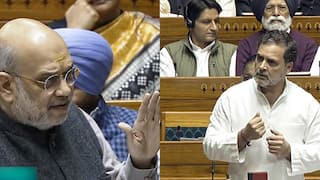Dems drop COVID-19 funds, clear way for OK of Ukraine aid
Washington, Mar 10 (AP): Democratic leaders abruptly abandoned plans for a fresh infusion of USD 1.

Washington, Mar 10 (AP): Democratic leaders abruptly abandoned plans for a fresh infusion of USD 15.6 billion for battling the Covid pandemic on Wednesday, clearing the way for House debate and passage of a vast government spending bill that is anchored by aid for Ukraine and European allies.
House Speaker Nancy Pelosi announced that the COVID-19 spending would be removed from the package after rank-and-file lawmakers objected that it would be paid for, in part, by cutting previously approved pandemic assistance to their states.
"We must proceed" with the government-wide USD 1.5 trillion legislation because of the urgency of helping Ukraine and the bill's spending for other programs, Pelosi wrote in a letter to colleagues.
"It is heartbreaking to remove the COVID funding, and we must continue to fight for urgently needed Covid assistance, but unfortunately that will not be included in this bill," she said.
The money countering the Russian blitzkriegt hat's devastated parts of Ukraine and triggered that continent's biggest refugee exodus since World War II ensured that the overall bill would ultimately pass with robust support from both parties.
President Joe Biden requested USD 10 billion for the military, humanitarian and economic aid last week, and backing in Congress was so staunch that the figure grew to USD 13.6 billion in just days.
"The people of Ukraine are courageously standing up for freedom,” Rep. Jim McGovern said as debate began. "Congress, the Biden administration and the people of the United States must stand with them." Party leaders planned to whip the 2,741-page measure through the House on Wednesday and the Senate by week's end, though that chamber's exact timing was unclear.
But the bill, which also contains USD 15.6 billion to continue battling the pandemic, was encountering early problems. Democratic leaders were trying to resolve rank-and-file complaints that some COVID-19 spending would be paid for with cuts in previously approved pandemic aid to states, though the dispute seemed unlikely to derail the package.
Lawmakers were spurred to act quickly by the urgency of helping Ukraine before Russia's military might makes it too late. They also faced a Friday deadline to approve the government-wide spending measure or face a weekend election-year federal shutdown. As a backstop against delays, the House planned to pass a bill Wednesday keeping agencies afloat through March 15.
"At the end of the day, it represents a good balance for Congress and the nation," Rep. Tom Cole said of the legislation.
Over USD 4 billion of the Ukraine aid was to help the country and Eastern European nations cope with the 2 million refugees who've already fled the fighting.
Another USD 6.7 billion was for the deployment of US troops and equipment to the region and to transfer American military items to Ukraine and US allies, and there was economic aid and money to enforce economic sanctions against Russia as well.
Senate Minority Leader Mitch McConnell said the measure would provide loan guarantees to Poland to help it replace aircraft it is sending Ukraine. "It's been like pulling teeth" to get Democrats to agree to some of the defense spending, he said. But McConnell added, "It's an important step. It needs to be passed. It needs to be passed quickly." The bipartisan rallying behind the Ukraine aid was just one manifestation of Congress' eagerness to help the beleaguered country, though not all of it has been harmonious.
Republicans accused Biden of moving too slowly to help Ukraine and NATO allies and to impose sanctions against Russia and its president, Vladimir Putin. Democrats countered that time was needed to bring along European allies that rely heavily on Russian energy sources. And a bipartisan push to ban Russian oil imports had become nearly unstoppable before Biden announced Tuesday that he would do that on his own.
The huge overall bill was stocked with victories for both parties.
For Democrats, it provides USD 730 billion for domestic programs, 6.7 per cent more than last year, the biggest boost in four years. Republicans won USD 782 billion for defense, 5.6 per cent over last year's levels.
In contrast, Biden's 2022 budget last spring proposed a 16 per cent increase for domestic programs and less than 2 per cent more for defense — numbers that were doomed from the start thanks to Democrats' slender congressional majorities.
The bill was also fuelled by large numbers of hometown projects for both parties' lawmakers, which Congress had banned since 2011 but were revived this year.
The spending — once called earmarks, now dubbed community projects — includes money for courthouses in Connecticut and Tennessee and repairs to a post office in West Virginia. And it names a federal building in Tuscaloosa, Alabama, after Sen. Richard Shelby, the state's senior GOP senator, a chief author of the bill who's retiring after six terms.
Democrats won a fresh round of spending for vaccines, testing and treatments for COVID-19, including USD 5 billion for fighting the pandemic around the world. That was below Biden's USD 22.5 billion request. (AP) NSD NSD
(This story is published as part of the auto-generated syndicate wire feed. No editing has been done in the headline or the body by ABP Live.)






































